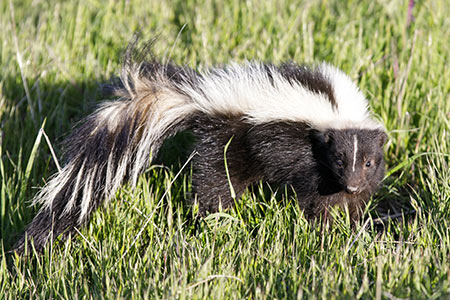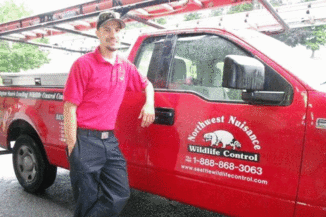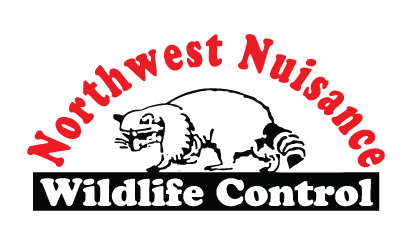Are skunks bringing an uninvited disruption to your tranquility? Let the proficient team at NW Nuisance Wildlife Control tackle this challenge for you. Armed with a unique blend of advanced removal tactics, preemptive measures, and exhaustive cleaning procedures, we stand ready to restore your skunk-disturbed space. Our licensed professionals are committed to prioritizing your well-being and contentment. We approach wildlife control from a perspective that’s anything but ordinary. Count on us for a safe, satisfying, and comprehensive solution, helping you maintain a skunk-free environment with confidence and ease.

Two species of skunk occur in Washington state, spotted skunks and striped skunk. The spotted skunk sometimes called a pole cat or civet cat is small 14-18 inches and rarely causes issues for people. The striped skunks are usually 22-32 inches in length. Skunks are omnivorous and will eat many types of food but their diet typically consists of insects.
Skunks may get into chicken coops, dig in lawn for grubs or get into crawlspaces or under decks. Skunk spray is extremely malodorous and can cause temporary blindness.
Q: What types of services does NW Nuisance Wildlife Control provide for skunk removal and control?
A: NW Nuisance Wildlife Control provides comprehensive skunk control services, which include advanced removal tactics, preemptive measures, and exhaustive cleaning procedures, all aimed at restoring your skunk-disturbed space.
Q: What types of skunks are found in Washington State and which one causes most issues for people?
A: Two species of skunks are found in Washington state: spotted skunks and striped skunks. The striped skunk, being larger in size, typically causes more issues for people.
Q: What kind of disruptions can skunks cause in residential or commercial spaces?
A: Skunks may cause a variety of disruptions such as getting into chicken coops, digging in lawns for grubs, or crawling into spaces under decks. Their spray is extremely malodorous and can cause temporary blindness.
Q: We have something trapped in our attic/stove vent/fireplace. Can you get it out?
A: More than likely, yes. We commonly remove birds, rats, squirrels, raccoons and other animals from attics, crawlspaces, stove vents, fireplaces and other locations in homes, garages and sheds.
Q: Do you remove dead animals from walls, attics, etc?
A: Yes. We can usually find and remove dead animals from inside structures. Please call for price quote.
Q: Can you pick up a dead animal from my yard or inside the house?
A: Yes. We offer dead animal removal and disposal services. Please call for price quote.
Q: Do you have anything to get rid of the smell from dead animals and skunks?
A: Yes. Please call us regarding the specifics of your odor removal needs.
Q: What is a “Wildlife Control Operator” or “WCO”?
A: A Wildlife Control Operator (or “WCO”) has a license from the Department of Fish and Wildlife that allows them trap, capture, and remove unclassified wildlife or small game from private property.
Q: What are your fees?
A: Service fees vary greatly depending on the task at hand. Please call us to receive a quote over the phone. If the situation requires us to visit the site before offering a quote, we will tell you this during the initial call
Q: What do you do with the animals that you catch?
A: All nuisance wildlife control operators in the state of Washington are required by law to euthanize the animals caught on private property. Nuisance wildlife cannot be transported and relocated/released.
Q: Do you offer consultation services?
A: Yes. Please call us and we will gladly discuss the situation at hand.
Q: Do you offer consultation services?
A: Yes. Please call us and we will gladly discuss the situation at hand.
Q: Are you licensed by the state?
A: Yes. We are licensed by the State of Washington and by the Washington Department of Fish and Wildlife. We are also bonded and insured.
About Us

NNWC, established in 1985 is one of the oldest and most trusted wildlife removal companies serving the PNW. We specialize in live trapping, animal control, exclusion and clean up.
We are licensed by the Washington Department of Fish and Wildlife to manage a variety of wildlife conflicts that include: raccoons, squirrels, opossums, beavers, nutria, river otters, mountain beavers, bats, skunks, bobcats and coyotes. We specialize in live animal removal. NNWC serves both residential and commercial customers offering solutions tailored to meet your specific nuisance wildlife conflict needs.
Our trappers have Bachelor of Arts degrees from the University of Idaho in Wildlife Resources and University of Southern California in Environmental Science. Collectively we have over 50 year’s wildlife management experience. Whatever the wildlife conflict we have the experience, knowledge and skill to humanely and professionally solve your problem.
Call us at 425 820-7476 to talk about the skunk removal process or you can email us at NNWC1985@willardspestcontrol.com


